Summer has passed, for the most part. My relatives have gone back to Texas for the winter. I'm not outside quite so much, although I do take my regular walks.
I purposely took a break from my blog, although I continued (and continue) studying throughout the break. With the colder weather comes more introspection and solitude, something I specifically avoid in the warm summer months. So now I can begin to get back to journaling my progress and thoughts.
I've continued, as was my plan, to focus on Turkish this year. It's going about as I expected it to go. This year is all about massive vocabulary acquisition, and I think I'm still on track to get my vocabulary above the 6000 word mark. I've finished the second level of Yeni Hitit and am about half way through the last level. Level 3 is largely about reading, and by extension, writing. So I've been picking up the book more sporadically than the first two volumes. For reading, I've just started to read Kayıp Sembol (The Lost Symbol), by Dan Brown. I've read the book in English, so I'm familiar with the story. Even so, I'm estimating it'll take me a little over two months to get through it. So far, there's a lot of new vocabulary for me to soak up, but I like the novel, so it keeps me interested. I still watch a hell of a lot of Turkish TV - around three hours a day. I'm actually quite comfortable watching most of what I find on Kanal D, maybe a little less so with the news on CNNTürk, although the vocabulary is pretty regular and not difficult to understand. The reason I say I'm maybe less comfortable with CNNTürk has to do with the subject matter. It's mostly politics and Syria and, well... politics. It's just not that interesting to me. So aside from the nightly news (really the morning news because of the time difference), I've focused more on Kanal D's programming, which keeps me plenty entertained and interested..
Back in June, my 6 Week Challenge to learn Piedmontese ended, and I considered it a success. I continue to read Piedmontese every day, and to listen to whatever I can find. I also write when I can, although, as I mentioned at the top of the post, my writing and journaling took a big hit over the summer. I love the language and I plan on perfecting it as much as I possibly can.
Georgian is another story.. While I got through Dodona Kiziria's Beginning Georgian and am happy with the results, I've not progressed much further than that. I tried to continue on with George Hewitt's Georgian: A Learner's Grammar, but frankly, I can't stand it. The book is so convoluted and disorganized to be taken as a course. I think it's a decent reference book, though. So I no longer crack that one open very often. My goal was to get to an A2-ish level by the end of the year. I'm not sure I'll make it. If I can find something as interesting as Beginning Georgian, but slightly more advanced, I may still have a chance. But we'll see. Even if I don't progress much further with Georgian, I'll still he content with what I've learned. It's an extremely difficult language - at least for me, and I go through cycles of really liking it and hating it. So I suppose the trick is to ride the high cycles and ignore the low ones.
I'm already thinking and planning how I'll be dealing with the level of Turkish I want for next year, but I still want to keep my plans under wraps for the time being.
Wednesday, September 12, 2012
Wednesday, May 30, 2012
Dedikodu etmek...
OK, this post isn't directly related to gossip, but I was recently reminded of it by a gossipy neighbor, which made me think of a verb form in Turkish that I rarely use: the reportative tense, or, as Aaron over on everydaylanguagelearner.com calls it, the gossip tense. I like that description. It's pretty fitting, and I tend to relate its use to that particular meaning, although there are other meanings for this verb form.
I need to start using it more, so I'm revisiting it in my studies. It's covered fairly early on in both Teach Yourself Turkish and Colloquial Turkish.
Basically, the rule is simple: you use to to distance yourself from something in the story. A rough English equivalent would be to tack on "Apparently", "so I've heard", "I guess", or "supposedly", among other similar connecting words. All that's needed is a "miş/muş/mış" ending to the word stem, or root. So, say I want to say "I heard it was interesting", I would say "Enteresanmış". I should also note that this same word - enteresanmış - also can be used to denote present tense, so it also means "I hear it's interesting". Of course, this isn't limited to adjectives or adverbs. It can also be used directly with verbs, for example "Apparently, he/she knows" - "Bilirmiş".
This verb form can also be used to denote something you're unsure of. So you can use it to ask and confirm a question, such as "Does he/she know?" - "Bilir miymiş?" (note the "y" buffer between mi and miş). In this case, we're not sure, but suspect that the person knows and we just need confirmation.
Other simple question words, such as "what", "where" or "why" can also have a "miş" ending to show unsureness, for example "Neredeymiş" - "Where was it/where do you suppose it was?".
All in all, it's a pretty simple concept. Not one we English speakers are used to, unless we constantly speak hypothetically. And really, that isn't a bad exercise to get used to the pattern.
So I'll be practicing this verb form with my Skype partner for the next couple sessions.
I need to start using it more, so I'm revisiting it in my studies. It's covered fairly early on in both Teach Yourself Turkish and Colloquial Turkish.
Basically, the rule is simple: you use to to distance yourself from something in the story. A rough English equivalent would be to tack on "Apparently", "so I've heard", "I guess", or "supposedly", among other similar connecting words. All that's needed is a "miş/muş/mış" ending to the word stem, or root. So, say I want to say "I heard it was interesting", I would say "Enteresanmış". I should also note that this same word - enteresanmış - also can be used to denote present tense, so it also means "I hear it's interesting". Of course, this isn't limited to adjectives or adverbs. It can also be used directly with verbs, for example "Apparently, he/she knows" - "Bilirmiş".
This verb form can also be used to denote something you're unsure of. So you can use it to ask and confirm a question, such as "Does he/she know?" - "Bilir miymiş?" (note the "y" buffer between mi and miş). In this case, we're not sure, but suspect that the person knows and we just need confirmation.
Other simple question words, such as "what", "where" or "why" can also have a "miş" ending to show unsureness, for example "Neredeymiş" - "Where was it/where do you suppose it was?".
All in all, it's a pretty simple concept. Not one we English speakers are used to, unless we constantly speak hypothetically. And really, that isn't a bad exercise to get used to the pattern.
So I'll be practicing this verb form with my Skype partner for the next couple sessions.
Sunday, May 20, 2012
More proof that watching TV works
I spend a lot of time on the HTLAL forums and learn all sorts of interesting things every day on the site. The reason I bring up HTLAL is because there was a discussion about FSI that comes up quite often; that the vocabulary is too outdated, and many people believe that the course is no longer of value. I disagree, personally. If all we're talking about is vocabulary, that's the easiest thing in the world to fix. But on with the story...
So, the discussion went something like this: "The FSI course teaches you to use the word işte, but when I asked a second generation student of mine, he told me he'd never heard of the word and to use bak instead."
OK, so right off the bat, this person wasn't going to the right source for information. Not knocking second generation speakers, but this kid is growing up in Germany, and probably hasn't spent much time (if any) in Turkey.
This brings me to the title of this post. When I read this discussion, by coincidence I had just watched a couple children's cartoons on Kanal D and they had actually used both these words, clearly demonstrating the difference in use through an ordinary conversation. It also demonstrates that the best way to get the most current, in use vocabulary is to sit in front of a TV and take the language in for an hour or two. Of course, conversations with natives are also great, but they're probably not the best way to get massive exposure, especially at a beginner-intermediate stage.
Every once in a while I think I might be watching a bit too much TV - I watch about 3 hours or so every day in Turkish. This was just proof to me that what I'm doing is, in fact, paying off. I'm not saying to just watch TV at the exclusion of all else. I still have my regular Skype sessions and am still going through my Yeni Hitit course. But for good old massive input, nothing beats the TV.
Continuing with the TV theme, I've started to watch another show, this one a home fix up/DIY show. The timing's perfect, since I've started working on the bunkhouse again, now that the weather is cooperating. I'll have to re-open that blog with some updated pictures, soon.
Anyway, the show is called "Evim Şahane". I'm getting new vocabulary that I probably wouldn't otherwise be getting. Things like zemin kaplama (flooring), store perde (window blinds) and aydınlatma (lighting). Since these are all things I'm replacing in the bunkhouse, it's easy to remember them every time I look at where they should be.
The TL;DR version of this post is simply this: For massive amounts of genuine input, watch TV. It works.
So, the discussion went something like this: "The FSI course teaches you to use the word işte, but when I asked a second generation student of mine, he told me he'd never heard of the word and to use bak instead."
OK, so right off the bat, this person wasn't going to the right source for information. Not knocking second generation speakers, but this kid is growing up in Germany, and probably hasn't spent much time (if any) in Turkey.
This brings me to the title of this post. When I read this discussion, by coincidence I had just watched a couple children's cartoons on Kanal D and they had actually used both these words, clearly demonstrating the difference in use through an ordinary conversation. It also demonstrates that the best way to get the most current, in use vocabulary is to sit in front of a TV and take the language in for an hour or two. Of course, conversations with natives are also great, but they're probably not the best way to get massive exposure, especially at a beginner-intermediate stage.
Every once in a while I think I might be watching a bit too much TV - I watch about 3 hours or so every day in Turkish. This was just proof to me that what I'm doing is, in fact, paying off. I'm not saying to just watch TV at the exclusion of all else. I still have my regular Skype sessions and am still going through my Yeni Hitit course. But for good old massive input, nothing beats the TV.
Continuing with the TV theme, I've started to watch another show, this one a home fix up/DIY show. The timing's perfect, since I've started working on the bunkhouse again, now that the weather is cooperating. I'll have to re-open that blog with some updated pictures, soon.
Anyway, the show is called "Evim Şahane". I'm getting new vocabulary that I probably wouldn't otherwise be getting. Things like zemin kaplama (flooring), store perde (window blinds) and aydınlatma (lighting). Since these are all things I'm replacing in the bunkhouse, it's easy to remember them every time I look at where they should be.
The TL;DR version of this post is simply this: For massive amounts of genuine input, watch TV. It works.
Monday, April 23, 2012
Georgian resources
I haven't written much about my progress with Georgian so far this year. One would think that I've dropped it, but I haven't. It's just going slow. And I really have no need for it to go any faster than it's been going. I only want to reach an A2 level, at most, in the language by the end of the year.
I've finished Dodona Kiziria's Beginner's Georgian. It's a good course, but maybe not the best "first" course I could have gone through. I'm now in the process of going through George Hewitt's Georgian: A Learner's Grammar. It's turning out to be a complicated, slow slog, but I'm getting through it.
I recently heard of a free resource over on the HTLAL forum: Peace Corps: Georgia (CAUTION! It's a zipped file that's close to 500M). It includes text and audio files, and there is a separate directory with a video podcast and accompanying book.
I have to say, I wish I'd discovered this course before I started in with Kiziria's course. It's extremely easy to follow, albeit basic. I sort of liken it to a short Pimsleur course, in that it's very audio-oriented. They do go over the alphabet and writing, but the audio's the star of the course. The video podcast section is quite nice, too. They don't throw the entire alphabet at you in one lesson. They do it over three, and use simple, useful words to reinforce what you're learning. You're reading the letters/words on-screen as the tutor says them. I thought it was very well thought out. Overall, the course doesn't cover all that much beyond survival skills: names, numbers, days, food, places, and other things you might find in a basic phrasebook. But for someone with no exposure to Georgian, I highly recommend it. And you can't beat free cost!
In other Georgian news, I'm behind in my song-learning plans. I'm a month behind, actually. So in May I'll have to find two songs to learn in order to catch up. Not a big deal, but it's something else to consider.
I've finished Dodona Kiziria's Beginner's Georgian. It's a good course, but maybe not the best "first" course I could have gone through. I'm now in the process of going through George Hewitt's Georgian: A Learner's Grammar. It's turning out to be a complicated, slow slog, but I'm getting through it.
I recently heard of a free resource over on the HTLAL forum: Peace Corps: Georgia (CAUTION! It's a zipped file that's close to 500M). It includes text and audio files, and there is a separate directory with a video podcast and accompanying book.
I have to say, I wish I'd discovered this course before I started in with Kiziria's course. It's extremely easy to follow, albeit basic. I sort of liken it to a short Pimsleur course, in that it's very audio-oriented. They do go over the alphabet and writing, but the audio's the star of the course. The video podcast section is quite nice, too. They don't throw the entire alphabet at you in one lesson. They do it over three, and use simple, useful words to reinforce what you're learning. You're reading the letters/words on-screen as the tutor says them. I thought it was very well thought out. Overall, the course doesn't cover all that much beyond survival skills: names, numbers, days, food, places, and other things you might find in a basic phrasebook. But for someone with no exposure to Georgian, I highly recommend it. And you can't beat free cost!
In other Georgian news, I'm behind in my song-learning plans. I'm a month behind, actually. So in May I'll have to find two songs to learn in order to catch up. Not a big deal, but it's something else to consider.
Monday, April 2, 2012
Time for another language diversion
Yesterday was April Fool's Day, 2012. I generally hate this day, because I'm sort of a technology and gadget junkie, and most tech sites tend to go full throttle on the gags. You can also find a few gags on some of the language sites, but they're mostly immune from the silliness of April Fool's.
With that in mind, I decided to go looking for a diversion from the languages I'm studying this year - mainly Turkish and secondarily Georgian. Truth be told, I was going through some old photos of my first ski trip to the Italian Alps and was reminded of a language I heard more than once up in the mountains of Piedmont - Piemontese, or Piemontèis. Piemontese is a Gallo-Italic language, a sub-group of the Romance language classification. The experience of hearing the language for the first time was interesting; it was one of "This sounds familiar. I should understand this, but I don't." A friend that went skiing with me, an Italian from Turin, saw the look on my face and said "Don't worry about it. I've lived here all my life and don't understand a word either."
So with that memory in mind, I set out to try and find some - any - learning resources on the internet. Early on in the day I tweeted that I wasn't finding much. I did, however, find a nice 20-lesson text-only course that I went through at Associazione Culturale Nòste Rèis, and thought it was pretty decent. Then I found a decent Piemontese-Italian dictionary which helped even more. With just those two resources, I was able to glean a lot.
And here is where things opened up for me as far as resources go. Getting through that short course and using a simple dictionary was enough for me to form complete sentences in the language, which meant I could now search using Piemontese in Google. Once I had enough of a vocabulary in the language to start searching for things, I found a wealth of resources online. I found so much, in fact, that it'll be enough to thoroughly learn the language at some point. I spent the day either outright downloading web pages and converting them to PDF files that I can use on my tablet, or bookmarking them for later reference.
All this brings me to something I've decided to participate in this year over at the How To Learn Any Language web site. Four times a year, they have a Six Weeks Challenge. I've never participated in one before, but would like to this year. I'm far enough along in my Turkish that it certainly won't get derailed - I spend on average more than three hours a day with Turkish. And I only plan on reaching an A2 level at best in Georgian, which I'm well on track to accomplishing. So I think Piemontese will be a nice project for an intense six weeks. I'm still not sure if I'll participate in the May challenge or the August challenge, but it'll be one of them.
I had originally thought to look at Afrikaans for the challenge, because I wanted a language that wouldn't distract too much from my primary goals and would be familiar enough that I wouldn't lose interest at the first sign of any difficulty. After spending the day with Piemontese, I think this language fits the bill. And truthfully, I have more interest in the language due to the region itself.
So there it is. I said I wasn't going to do three languages this year. I lied.
With that in mind, I decided to go looking for a diversion from the languages I'm studying this year - mainly Turkish and secondarily Georgian. Truth be told, I was going through some old photos of my first ski trip to the Italian Alps and was reminded of a language I heard more than once up in the mountains of Piedmont - Piemontese, or Piemontèis. Piemontese is a Gallo-Italic language, a sub-group of the Romance language classification. The experience of hearing the language for the first time was interesting; it was one of "This sounds familiar. I should understand this, but I don't." A friend that went skiing with me, an Italian from Turin, saw the look on my face and said "Don't worry about it. I've lived here all my life and don't understand a word either."
So with that memory in mind, I set out to try and find some - any - learning resources on the internet. Early on in the day I tweeted that I wasn't finding much. I did, however, find a nice 20-lesson text-only course that I went through at Associazione Culturale Nòste Rèis, and thought it was pretty decent. Then I found a decent Piemontese-Italian dictionary which helped even more. With just those two resources, I was able to glean a lot.
And here is where things opened up for me as far as resources go. Getting through that short course and using a simple dictionary was enough for me to form complete sentences in the language, which meant I could now search using Piemontese in Google. Once I had enough of a vocabulary in the language to start searching for things, I found a wealth of resources online. I found so much, in fact, that it'll be enough to thoroughly learn the language at some point. I spent the day either outright downloading web pages and converting them to PDF files that I can use on my tablet, or bookmarking them for later reference.
All this brings me to something I've decided to participate in this year over at the How To Learn Any Language web site. Four times a year, they have a Six Weeks Challenge. I've never participated in one before, but would like to this year. I'm far enough along in my Turkish that it certainly won't get derailed - I spend on average more than three hours a day with Turkish. And I only plan on reaching an A2 level at best in Georgian, which I'm well on track to accomplishing. So I think Piemontese will be a nice project for an intense six weeks. I'm still not sure if I'll participate in the May challenge or the August challenge, but it'll be one of them.
I had originally thought to look at Afrikaans for the challenge, because I wanted a language that wouldn't distract too much from my primary goals and would be familiar enough that I wouldn't lose interest at the first sign of any difficulty. After spending the day with Piemontese, I think this language fits the bill. And truthfully, I have more interest in the language due to the region itself.
So there it is. I said I wasn't going to do three languages this year. I lied.
Wednesday, March 7, 2012
March progress - Turkish
I figured I should give an overall status of where I am so far this year with Turkish. I'm continuing on with my normal plan, and I've also added a couple things as I've progressed.
My main study material continues to be Yeni Hitit. I've completed volume 1 and am about a fourth of the way into the second volume. The first volume gave me quite a bit of new vocabulary, but not much new in the way of grammar. One grammar point that I had studied prior, but Yeni Hitit really drove it home for me, was the simple present subjunctive mood. The last part of volume 1 had a lot of practical examples, and the workbook had many exercises to practice using subjunctive. I gained close to 400 new words from volume 1.These are every day words that I probably should have already known, but just didn't have the exposure. I've made sure to try and use a lot of the new vocabulary in my conversations with my Skype partner, when possible.
I mentioned in a previous post that I've also started using Busuu. I've now completed both the A1 and A2 courses. Neither course gave me any new grammar, but I got a TON of new vocabulary. I gained another 360 words from the two courses. Again, these are every day words that come in handy. They differ from what I've learned from Yeni Hitit, in that most of Busuu's vocabulary is in the form of adjectives and adverbs. All these adjectives and adverbs have really helped push my conversation forward from basic to a more intermediate level. I can express so much more with this added vocabulary.
I've now started on the B1 course in Busuu, and am already running into new grammar. I continue to be impressed by Busuu in general, but also in how much the courses cover, provided I pay attention to the actual examples and not just new vocabulary. Their example sentences really show good usage of both vocabulary and new grammar points.
Of course, I continue to watch a lot of TV - 3 or more hours a day. These hours are concentrated viewing, for the most part, and they happen at the end of my day. It's always a mix of a soap, the news (which, due to the time difference, is the morning news), and finally a daytime interest-type show. In particular, I've learned a lot from Mutfağım.
And finally, for all those little in-between moments, I use Twitter to inform me of everything from news headlines to when a program is starting on Kanal D or CNNTürk. When I first started using Twitter for this, I used the application's built-in translator for words I didn't know. I now mostly just make a note of a word that I don't know, then look it up later, or - increasingly more common - I understand it from context.
I'm pretty happy with my progress so far this year. I'm making a huge effort to surround myself with the language in as many forms as I can throughout my day. My plan to get to a solid B2 level by the end of the year is looking pretty attainable at this point.
My main study material continues to be Yeni Hitit. I've completed volume 1 and am about a fourth of the way into the second volume. The first volume gave me quite a bit of new vocabulary, but not much new in the way of grammar. One grammar point that I had studied prior, but Yeni Hitit really drove it home for me, was the simple present subjunctive mood. The last part of volume 1 had a lot of practical examples, and the workbook had many exercises to practice using subjunctive. I gained close to 400 new words from volume 1.These are every day words that I probably should have already known, but just didn't have the exposure. I've made sure to try and use a lot of the new vocabulary in my conversations with my Skype partner, when possible.
I mentioned in a previous post that I've also started using Busuu. I've now completed both the A1 and A2 courses. Neither course gave me any new grammar, but I got a TON of new vocabulary. I gained another 360 words from the two courses. Again, these are every day words that come in handy. They differ from what I've learned from Yeni Hitit, in that most of Busuu's vocabulary is in the form of adjectives and adverbs. All these adjectives and adverbs have really helped push my conversation forward from basic to a more intermediate level. I can express so much more with this added vocabulary.
I've now started on the B1 course in Busuu, and am already running into new grammar. I continue to be impressed by Busuu in general, but also in how much the courses cover, provided I pay attention to the actual examples and not just new vocabulary. Their example sentences really show good usage of both vocabulary and new grammar points.
Of course, I continue to watch a lot of TV - 3 or more hours a day. These hours are concentrated viewing, for the most part, and they happen at the end of my day. It's always a mix of a soap, the news (which, due to the time difference, is the morning news), and finally a daytime interest-type show. In particular, I've learned a lot from Mutfağım.
And finally, for all those little in-between moments, I use Twitter to inform me of everything from news headlines to when a program is starting on Kanal D or CNNTürk. When I first started using Twitter for this, I used the application's built-in translator for words I didn't know. I now mostly just make a note of a word that I don't know, then look it up later, or - increasingly more common - I understand it from context.
I'm pretty happy with my progress so far this year. I'm making a huge effort to surround myself with the language in as many forms as I can throughout my day. My plan to get to a solid B2 level by the end of the year is looking pretty attainable at this point.
Saturday, February 25, 2012
Adding Busuu into my mix of resources
I was recently going through some old email, and found one from Busuu from when I'd signed up for the service. I'd forgotten that I had an account with them, but I'd signed up with them last year when they introduced Turkish as one of their languages being taught. I'm not sure why I never pursued it, but I forgot about Busuu after I'd created my account.
In any case, I decided to give them another look. I'm glad I did. It's proving to be a good addition to my current resources.
They currently offer English, Spanish, French, Italian, Portuguese, Russian, Polish, Turkish, Arabic, Japanese and Chinese as full courses, but you can choose other languages to study, as I'll note later.
I wanted to start at their A2 level course and go from there, but it either wasn't allowed or I wasn't able to figure out how, so I had to go back to the beginner A1 course. It took me about four days to get through the A1 course. It's been a really good refresher, and I picked up some more vocabulary too. I can honestly say it's much more complete than, say, Teach Yourself Turkish, or even FSI. As a non-paying member, I was able to complete 25 lessons from the A1 course, but I think there are 35 lessons in total. The ten lessons that I didn't have access to appear to be mostly grammar-related. That's OK, since A1 is a refresher for me. I've now started on the A2 course. If I were a paying member, I would have access to much more material, including downloadable audio and PDFs of all the lesson material.
I think what probably impresses me most about Busuu though, is the social factor. Sure, there are other sites that offer a social aspect to learning, but I've not seen so much social interaction as I have on Busuu. Lang-8 comes close, but you don't get the camaraderie of shared courses like you do with Busuu. After every single exercise I completed, within seconds I had corrections, encouragement and requests for friendships. The chat and other realtime features are pretty good, and quite useful. I guess I should probably note that Busuu, like any other socially-powered site, has its share of people just looking to hook up. If that's what you're into, fine, but Busuu gives you ways to combat it if you need to, by blocking/reporting as spam, as well as up/down voting in the comments and critiques of your writing exercises.
Knowing that they didn't have any Georgian course, I still specified that I was learning the language. It gave me the option to search for native Georgian speakers and returned pages of users, so that may be an option for lesser spoken language conversation partners.
I can't really comment on the upper lesson levels, since I've just started to use the service in earnest, but if the quality remains as it has with the first course, I'm probably going to spring the €75 for 12 months of premium access.
I highly recommend it as an additional resource!
Wednesday, February 15, 2012
Cooking shows
In my quest to expand my Turkish vocabulary this year, I've started to watch a couple cooking shows on Kanal D, in addition to all the other programming I'm soaking up. One of these is Mutfağim (My kitchen). It's squarely aimed at women, at least that's all I've seen on the show so far, but who cares? I'm learning a lot from it!
I love Turkish food, so any cooking show about Turkish food has my interest. And I also like to cook, even if I'm not the best cook in the world.
I've already learned a few general food items, such as meyve (fruit), sebze (vegetable), ekmek (bread), peynir (cheese), piliç (chicken), etc. But actually cooking a dish takes some other vocabulary that I didn't have. This is where the cooking shows come in. I learned this helpful trick from an Italian teacher I had years ago. She would actually bring in a hotplate to the class and we'd learn how to cook a simple dish, then enjoy the results after class.
So in these shows, I learn all sorts of useful words like karıştırmak (to mix or blend), eklemek (to add in) and beklemek (to let sit). I also learn basic kitchen terms for measurements, such as bardak (a cup), kaşık (a spoonful) and demet (as in demet maydanoz- a bunch/bundle of parley).
Another little trick I learned a while back was to prepare my shopping lists in the target language with no English translation. If, while at the store, I couldn't remember what the word meant, I did without.
You can bet that it only took one trip to the store and forgetting to thoroughly learn words like un (flour), yumurta (egg), sarımsak (garlic) and maya (yeast).
It may not seem like a lot of new words, but each one of those words is useful, and something I can use daily - well, except for maybe yeast.
So, lahmacun, here I come! Once I've successfully made it, I'll post the yapılışı (the directions or preparation) for the lahmacun tarifi (lahmacun recipe).
I love Turkish food, so any cooking show about Turkish food has my interest. And I also like to cook, even if I'm not the best cook in the world.
I've already learned a few general food items, such as meyve (fruit), sebze (vegetable), ekmek (bread), peynir (cheese), piliç (chicken), etc. But actually cooking a dish takes some other vocabulary that I didn't have. This is where the cooking shows come in. I learned this helpful trick from an Italian teacher I had years ago. She would actually bring in a hotplate to the class and we'd learn how to cook a simple dish, then enjoy the results after class.
So in these shows, I learn all sorts of useful words like karıştırmak (to mix or blend), eklemek (to add in) and beklemek (to let sit). I also learn basic kitchen terms for measurements, such as bardak (a cup), kaşık (a spoonful) and demet (as in demet maydanoz- a bunch/bundle of parley).
Another little trick I learned a while back was to prepare my shopping lists in the target language with no English translation. If, while at the store, I couldn't remember what the word meant, I did without.
You can bet that it only took one trip to the store and forgetting to thoroughly learn words like un (flour), yumurta (egg), sarımsak (garlic) and maya (yeast).
It may not seem like a lot of new words, but each one of those words is useful, and something I can use daily - well, except for maybe yeast.
So, lahmacun, here I come! Once I've successfully made it, I'll post the yapılışı (the directions or preparation) for the lahmacun tarifi (lahmacun recipe).
Friday, February 3, 2012
Quizlet and Anki
It's been a pretty busy last two weeks with work. I'm grateful - normally January and February are my slowest months.
Part of the reason I've been so busy with work is because I've been asked to create an online language course for ESL learners. That's the subject for another post, but it's a very involved project and one that I'm very excited about.
Anyway, one of the tasks in this ESL course project was to create a sort of online flashcard-type quiz. In my research, I discovered Quizlet.com. I'm not a huge fan of flashcards, although I do use them in my "wasted minutes" throughout the day. But I use Anki for that, personally. I'm not really one to sit in front of my computer with flashcards. I have no problem using them when on the go or on my tablet, though.
While poking around the site, I found some pretty good decks that I could use myself. It seems the quality of the decks vary because anyone can create them, I suppose. So it pays to really look at what's there.
I'll go through what I did to get a deck from Quizlet into Anki in this post. It's easy, but manual.
First, I found a deck I wanted to use - I chose a deck called "1000 common words in Turkish":
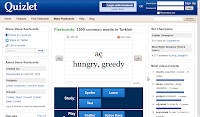
If you scroll down the page, there's an option to Export the deck:
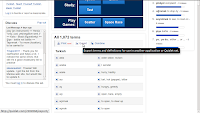
I clicked on that, which took me to:
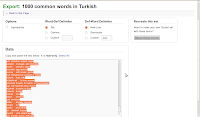
I made sure that "Tab" and "New Line" were selected as the delimiters, then copied and pasted the contents into a text editor. I'm using Ubuntu on my PC, so I just used GEdit, but any editor will do. I then just saved the text file as a normal .txt file.
Next, I opened up Anki and clicked on "Import" (disregard the number of reviews due - a clue of how often I use Anki, I guess.) Once you click on "Import", you're prompted for a name to use to create the new deck:
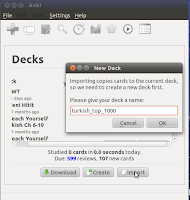
Then, I clicked on the "Import" button for Field 1 on the Import screen:
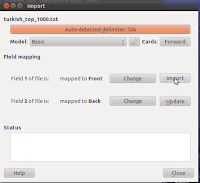
If all goes well, you'll get a Status dialog telling you the import is complete:
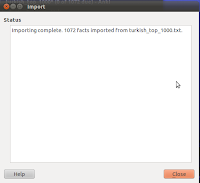
And that's it! Now the deck is usable in Anki and can be synced to AnkiWeb, then transferred to your smartphone or tablet Anki application.
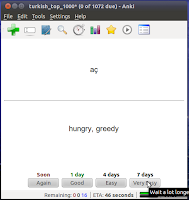
There were quite a few decks I saw on Quizlet that interested me, so I'll probably be back to check them out. I might also look at some of the other things they do on the site. The social aspect and some of the "competitive study" games look interesting.
Part of the reason I've been so busy with work is because I've been asked to create an online language course for ESL learners. That's the subject for another post, but it's a very involved project and one that I'm very excited about.
Anyway, one of the tasks in this ESL course project was to create a sort of online flashcard-type quiz. In my research, I discovered Quizlet.com. I'm not a huge fan of flashcards, although I do use them in my "wasted minutes" throughout the day. But I use Anki for that, personally. I'm not really one to sit in front of my computer with flashcards. I have no problem using them when on the go or on my tablet, though.
While poking around the site, I found some pretty good decks that I could use myself. It seems the quality of the decks vary because anyone can create them, I suppose. So it pays to really look at what's there.
I'll go through what I did to get a deck from Quizlet into Anki in this post. It's easy, but manual.
First, I found a deck I wanted to use - I chose a deck called "1000 common words in Turkish":

If you scroll down the page, there's an option to Export the deck:

I clicked on that, which took me to:

I made sure that "Tab" and "New Line" were selected as the delimiters, then copied and pasted the contents into a text editor. I'm using Ubuntu on my PC, so I just used GEdit, but any editor will do. I then just saved the text file as a normal .txt file.
Next, I opened up Anki and clicked on "Import" (disregard the number of reviews due - a clue of how often I use Anki, I guess.) Once you click on "Import", you're prompted for a name to use to create the new deck:

Then, I clicked on the "Import" button for Field 1 on the Import screen:

If all goes well, you'll get a Status dialog telling you the import is complete:

And that's it! Now the deck is usable in Anki and can be synced to AnkiWeb, then transferred to your smartphone or tablet Anki application.

There were quite a few decks I saw on Quizlet that interested me, so I'll probably be back to check them out. I might also look at some of the other things they do on the site. The social aspect and some of the "competitive study" games look interesting.
Monday, January 23, 2012
Using Learning With Texts
I've known about a program called Learning with Texts for a while now, but only just got around to installing it and beginning to use it. It's a great tool!
At first glance, it looks like it's a pretty involved install process. It's really not, and took me less than half an hour to get everything set up. I have a free hosted account on 000webhost.com, so I set it up there. I can access it anywhere over the internet. But it can also be installed locally on Windows, Macs or Linux PCs. I will probably also install a local copy on my Linux/Ubuntu PC so I have a mirrored backup.
I won't go into the install details. They're explained pretty well on the Learning With Texts web site. In this post, I'll concentrate on how I'm using it.
The Main screen is simple and nicely laid out:
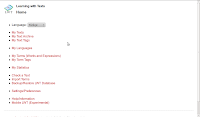 Everything can be initiated from this page.
Everything can be initiated from this page.
I added my languages by clicking on the "My Languages" link:
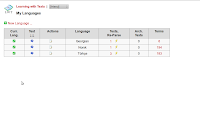
Once I added my languages, it was time to add some text. I did this through the "My Text" link:
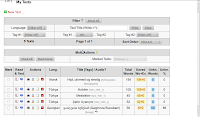 I also added Tags to easily sift through all the information as my text collection grows.
I also added Tags to easily sift through all the information as my text collection grows.
Once the text was added, I could then begin to read, edit and categorize the text, using dictionaries I'd defined in the "My Languages" set up page. There was also an option to use Google Translate for sentence translations, as opposed to single word translations.
When looking up a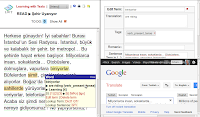 nd editing words, a value of 1-5 can be set, indicating how well you know the word. You can also choose "Well Known" or "Ignore" for words. I've been using "Ignore" for things like proper names, where a translation isn't needed. These levels are shown in different colors, according to what knowledge level you've set.
nd editing words, a value of 1-5 can be set, indicating how well you know the word. You can also choose "Well Known" or "Ignore" for words. I've been using "Ignore" for things like proper names, where a translation isn't needed. These levels are shown in different colors, according to what knowledge level you've set.
In my Georgian studies, I'm specifically using songs to learn the language. You can add audio as media too!
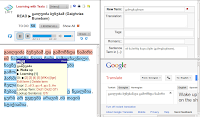 This makes it easy to follow the text as the song or other audio plays.
This makes it easy to follow the text as the song or other audio plays.
Once you've got everything entered, edited and categorized, you can check out how you're progressing through the "My Statistics" link:
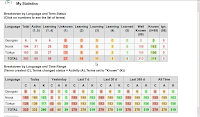
From there, you can drill further down using filters based on your level (1-5), as well as tags.
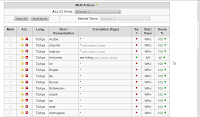
I sometimes use Anki during down or wasted minutes to review words and phrases. Learning With Texts provides a way to export these filtered lists so that they can be easily imported into Anki:
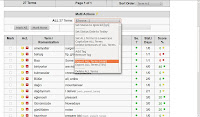
I'm finding a lot of use with this software. It's going to take me a while to enter everything I want to enter, but it's a great way to visualize my progress and keep track of what exactly I'm learning.
I highly recommend it!
At first glance, it looks like it's a pretty involved install process. It's really not, and took me less than half an hour to get everything set up. I have a free hosted account on 000webhost.com, so I set it up there. I can access it anywhere over the internet. But it can also be installed locally on Windows, Macs or Linux PCs. I will probably also install a local copy on my Linux/Ubuntu PC so I have a mirrored backup.
I won't go into the install details. They're explained pretty well on the Learning With Texts web site. In this post, I'll concentrate on how I'm using it.
The Main screen is simple and nicely laid out:
 Everything can be initiated from this page.
Everything can be initiated from this page.I added my languages by clicking on the "My Languages" link:

Once I added my languages, it was time to add some text. I did this through the "My Text" link:
 I also added Tags to easily sift through all the information as my text collection grows.
I also added Tags to easily sift through all the information as my text collection grows.Once the text was added, I could then begin to read, edit and categorize the text, using dictionaries I'd defined in the "My Languages" set up page. There was also an option to use Google Translate for sentence translations, as opposed to single word translations.
When looking up a
 nd editing words, a value of 1-5 can be set, indicating how well you know the word. You can also choose "Well Known" or "Ignore" for words. I've been using "Ignore" for things like proper names, where a translation isn't needed. These levels are shown in different colors, according to what knowledge level you've set.
nd editing words, a value of 1-5 can be set, indicating how well you know the word. You can also choose "Well Known" or "Ignore" for words. I've been using "Ignore" for things like proper names, where a translation isn't needed. These levels are shown in different colors, according to what knowledge level you've set.In my Georgian studies, I'm specifically using songs to learn the language. You can add audio as media too!
 This makes it easy to follow the text as the song or other audio plays.
This makes it easy to follow the text as the song or other audio plays.Once you've got everything entered, edited and categorized, you can check out how you're progressing through the "My Statistics" link:

From there, you can drill further down using filters based on your level (1-5), as well as tags.

I sometimes use Anki during down or wasted minutes to review words and phrases. Learning With Texts provides a way to export these filtered lists so that they can be easily imported into Anki:

I'm finding a lot of use with this software. It's going to take me a while to enter everything I want to enter, but it's a great way to visualize my progress and keep track of what exactly I'm learning.
I highly recommend it!
Monday, January 16, 2012
More TV
They've recently moved the schedule around at Kanal D, so I can no longer watch my two soaps - Asi and Yabancı Damat - at the normal time I've been watching them. Kanal D offers all Asi episodes online, so I can still watch that whenever I want, but Yabancı Damat seems to have been wiped from the site, so if I want to continue watching the show, I'll have to find other means.
Another show, "Gece Gündüz" (Night and Day), is now showing in the timeslot that Yabancı Damat used to play. I initially dismissed it. The first episode I saw prominently featured a character named "Sipsi", which was beyond over-the-top silly, but I've grown to like it. It's a standard good cop, bad cop show.
Speaking of cops shows, I'm also really getting into another show on Kanal D called "Arka Sokaklar" (Back Streets). The show initially ran in 2006. I'm liking it a lot!
And finally the last show I'm starting to watch is "Kuzey Güney" (North South). It's a fairly new soap on Kanal D that started broadcasting late last year.
I'm continuing to watch my normal news shows, Güne Merhaba and Günaydın, as well as Burada Laf Çok. There's certainly no shortage of video input for me, and it's all helping to increase my vocabulary.
Speaking of vocabulary, I've gone a couple lessons deeper into Yeni Hitit. I can't praise this course enough! While I'm not getting any new grammar (yet), I'm getting so much new vocabulary - all of it comprehensible. I run into a lot of words I don't know, but I rarely use the dictionary to figure out the meaning. There's so much included visually in the course, whether it's a photo or an illustration, that it's enough of a clue to figure out any unknown vocabulary. And that's what makes it stick for me. I wish I'd started in with this course sooner. It's that good.
Another show, "Gece Gündüz" (Night and Day), is now showing in the timeslot that Yabancı Damat used to play. I initially dismissed it. The first episode I saw prominently featured a character named "Sipsi", which was beyond over-the-top silly, but I've grown to like it. It's a standard good cop, bad cop show.
Speaking of cops shows, I'm also really getting into another show on Kanal D called "Arka Sokaklar" (Back Streets). The show initially ran in 2006. I'm liking it a lot!
And finally the last show I'm starting to watch is "Kuzey Güney" (North South). It's a fairly new soap on Kanal D that started broadcasting late last year.
I'm continuing to watch my normal news shows, Güne Merhaba and Günaydın, as well as Burada Laf Çok. There's certainly no shortage of video input for me, and it's all helping to increase my vocabulary.
Speaking of vocabulary, I've gone a couple lessons deeper into Yeni Hitit. I can't praise this course enough! While I'm not getting any new grammar (yet), I'm getting so much new vocabulary - all of it comprehensible. I run into a lot of words I don't know, but I rarely use the dictionary to figure out the meaning. There's so much included visually in the course, whether it's a photo or an illustration, that it's enough of a clue to figure out any unknown vocabulary. And that's what makes it stick for me. I wish I'd started in with this course sooner. It's that good.
Saturday, January 14, 2012
Learning my first Georgian song
I mentioned in a previous post that one of my goals was to learn one popular Georgian song each month. After listening to many, many songs, I've decided on my first song to learn - it's "გაიღვიძა ბუნებამ" (Gaigviza Bunebam, meaning "Nature has awoken") by Mgzavrebi.
I chose this song for a couple reasons. Number one, it had to be singable with a memorable melody. I'm just not going to learn something that's not floating around in my head, and a memorable melody will easily stick. Second, I could find the lyrics online, written in Georgian, which is giving me some more reading practice.
The more I listen to it, the more I like it. It's got a pretty, yet easily singable and memorable melody and the song has recognizable and repeatable verses and choruses.
The Georgian music site I'd posted about earlier lets me download individual songs, so I can stick it on my mp3 player and listen to it offline.
In briefly looking at what Google Translate gives me, it looks like the song is mostly in the present tense, except for part of the refrain, so I consider that a plus for as early on as I am with the language.
Anyway, here are the full lyrics for the song. I found them here:
გაიღვიძა ბუნებამ,და გამოჩნდა ნაპირი
იმ ნაპირზე ნავია,ჩემი გამოგზავნილი,
ნავზე თეთრი თოლია,ფიქრებს გამოჰყოლია,
ჰარმონია ბუნების,სრული მელანქოლია.
მებადური ზღვაშია,მისი ბადე წყალშია,
ყურს არ უგდებს არავის,ის თავის სტიქიაშია,
გაიღვიძა ბუნებამ,და გამოჩნდა ნაპირი,
იმ ნაპირზე ნავია,ჩემი გამოგზავნილი.
მეთევზე,ნავი,ბადე,თოლი ა
ზღვა,ცა,ნაპირი ჩემი მგონია,
წუთები წამებს ვეღარ ეწევა,
ვერც დაეწევა, ასე მგონია,
ღრუბელი ღრუბელს თუ დაეჯახა,
წვიმა წამოვა, ასე მგონია,
მეთევზემ თევზი თუ დაიჭირა,
ვერც ცაც ეწეწვა,ასე მგონია,,,
გაიღვიძა ბუნებამ,და გამოჩნდა ნაპირი,
იმ ნაპირზე ნავია,ჩემი გამოგზავნილი,
გაიღვიძა ბუნებამ,და გამოჩნდა ნაპირი,
იმ ნაპირზე ნავია,ჩემი გამოგზავნილი
I chose this song for a couple reasons. Number one, it had to be singable with a memorable melody. I'm just not going to learn something that's not floating around in my head, and a memorable melody will easily stick. Second, I could find the lyrics online, written in Georgian, which is giving me some more reading practice.
The more I listen to it, the more I like it. It's got a pretty, yet easily singable and memorable melody and the song has recognizable and repeatable verses and choruses.
The Georgian music site I'd posted about earlier lets me download individual songs, so I can stick it on my mp3 player and listen to it offline.
In briefly looking at what Google Translate gives me, it looks like the song is mostly in the present tense, except for part of the refrain, so I consider that a plus for as early on as I am with the language.
Anyway, here are the full lyrics for the song. I found them here:
გაიღვიძა ბუნებამ,და გამოჩნდა ნაპირი
იმ ნაპირზე ნავია,ჩემი გამოგზავნილი,
ნავზე თეთრი თოლია,ფიქრებს გამოჰყოლია,
ჰარმონია ბუნების,სრული მელანქოლია.
მებადური ზღვაშია,მისი ბადე წყალშია,
ყურს არ უგდებს არავის,ის თავის სტიქიაშია,
გაიღვიძა ბუნებამ,და გამოჩნდა ნაპირი,
იმ ნაპირზე ნავია,ჩემი გამოგზავნილი.
მეთევზე,ნავი,ბადე,თოლი ა
ზღვა,ცა,ნაპირი ჩემი მგონია,
წუთები წამებს ვეღარ ეწევა,
ვერც დაეწევა, ასე მგონია,
ღრუბელი ღრუბელს თუ დაეჯახა,
წვიმა წამოვა, ასე მგონია,
მეთევზემ თევზი თუ დაიჭირა,
ვერც ცაც ეწეწვა,ასე მგონია,,,
გაიღვიძა ბუნებამ,და გამოჩნდა ნაპირი,
იმ ნაპირზე ნავია,ჩემი გამოგზავნილი,
გაიღვიძა ბუნებამ,და გამოჩნდა ნაპირი,
იმ ნაპირზე ნავია,ჩემი გამოგზავნილი
Wednesday, January 11, 2012
Yeni Hitit
My major goal with Turkish this year is to double my vocabulary. I think I've got a pretty good handle on at least the grammar basics, so vocabulary is my focus, although I'll certainly be doing review of already known grammar and hopefully taking in some new grammar too.
I've got the complete "Yeni Hitit" 3-volume course and my plan is to use volume one for grammar review and learn new vocabulary, then continue on to volumes two and three, which most likely has all new grammar material for me.
I'm only about half way through volume one and, I gotta say, it's packed with new vocabulary. I'm well over three hundred new words at this point. I'm finding I'm remembering the vocabulary really well too. The book is full of colorful illustrations and diagrams that make all this new material really comprehensible. All these visual cues help reinforce the meaning.
I'm finding that the grammar review is pretty comprehensive too. Volume one really gets into the subjunctive mood later on in the book. I had looked at the subjunctive last year, but I can already tell that I'm going to get much more exposure to it in this course. I haven't even cracked volume two or three to see what all is covered, but I can only imagine it's going to be a really complete course.
When I'm Skyping with my conversation partner, it's pretty easy to just rely on what I've already learned and not really push myself with either vocabulary or grammar. I'm hoping this, combined with all the other media I'm taking in, will help.
All in all, I'm really happy with Yeni Hitit. I think it's going to pull me out of my intermediate funk.
I've got the complete "Yeni Hitit" 3-volume course and my plan is to use volume one for grammar review and learn new vocabulary, then continue on to volumes two and three, which most likely has all new grammar material for me.
I'm only about half way through volume one and, I gotta say, it's packed with new vocabulary. I'm well over three hundred new words at this point. I'm finding I'm remembering the vocabulary really well too. The book is full of colorful illustrations and diagrams that make all this new material really comprehensible. All these visual cues help reinforce the meaning.
I'm finding that the grammar review is pretty comprehensive too. Volume one really gets into the subjunctive mood later on in the book. I had looked at the subjunctive last year, but I can already tell that I'm going to get much more exposure to it in this course. I haven't even cracked volume two or three to see what all is covered, but I can only imagine it's going to be a really complete course.
When I'm Skyping with my conversation partner, it's pretty easy to just rely on what I've already learned and not really push myself with either vocabulary or grammar. I'm hoping this, combined with all the other media I'm taking in, will help.
All in all, I'm really happy with Yeni Hitit. I think it's going to pull me out of my intermediate funk.
Monday, January 9, 2012
Getting into Georgian
In between all my Turkish studies and media consumption, I've begun some of my Georgian lessons. I've now completed two lessons from Dodona Kiziria's "Beginning Georgian", as well as the first three lessons in the Peace Corps Georgian language Beginner Program.
Both courses start off with the alphabet. I'm pretty comfortable with it by now. In fact, I remembered quite a bit of it from my look at it last April. I've set my laptop up to be able to use the Georgian keyboard layout, and I've also got a soft Georgian keyboard for my Android tablet. I don't really plan on doing to much handwriting, but I also have Genial Writing that I can use.
In the following two lessons of each course, they go over basic introductions, the present tense for "to be", etc. Interestingly, Georgian does not have an infinitive form for verbs, so all verbs are noted in an active form. The Kiziria book always uses the second person singular form. It'll be interesting to see how useful dictionaries are when I get to the point of needing them. I know that there are a couple dictionaries out there that list every person and conjugation of a verb. That seems like overkill to me, but when the time comes, we'll see.
One of my goals I've listed over on accompl.sh for Georgian this year is to learn the words to one popular song every month. I've found a pretty great Georgian music site here that I think will help a lot for that. It's going to take me a while to settle on which songs I want to learn, but the characteristics that I'm looking for are something that will aid in my pronunciation and a good, singable melody.
Speaking of accompl.sh, I've also joined a fairly active challenge over there to complete 8 lessons of a language course within 30 days. I'm using the Kiziria course for that.
I initially thought that it would be difficult finding resources to learn Georgian, but I'm finding plenty. Certainly enough to keep me busy.
Both courses start off with the alphabet. I'm pretty comfortable with it by now. In fact, I remembered quite a bit of it from my look at it last April. I've set my laptop up to be able to use the Georgian keyboard layout, and I've also got a soft Georgian keyboard for my Android tablet. I don't really plan on doing to much handwriting, but I also have Genial Writing that I can use.
In the following two lessons of each course, they go over basic introductions, the present tense for "to be", etc. Interestingly, Georgian does not have an infinitive form for verbs, so all verbs are noted in an active form. The Kiziria book always uses the second person singular form. It'll be interesting to see how useful dictionaries are when I get to the point of needing them. I know that there are a couple dictionaries out there that list every person and conjugation of a verb. That seems like overkill to me, but when the time comes, we'll see.
One of my goals I've listed over on accompl.sh for Georgian this year is to learn the words to one popular song every month. I've found a pretty great Georgian music site here that I think will help a lot for that. It's going to take me a while to settle on which songs I want to learn, but the characteristics that I'm looking for are something that will aid in my pronunciation and a good, singable melody.
Speaking of accompl.sh, I've also joined a fairly active challenge over there to complete 8 lessons of a language course within 30 days. I'm using the Kiziria course for that.
I initially thought that it would be difficult finding resources to learn Georgian, but I'm finding plenty. Certainly enough to keep me busy.
Wednesday, January 4, 2012
Infomercials
Infomercials. I generally hate them. They don't add anything positive to my life, and what they're usually peddling isn't something I would want, much less need.
So last night in between my usual Turkish shows "Yabancı Damat" and "Günaydın" on Kanal D there was about a ten minute gap that they sometimes use to show music videos or other random things. Last night it happened to be an infomercial. I've seen the infomercial before, or at least when it starts, but I usually switch away before I even know what the product is that they're selling. Out of laziness, I kept the infomercial running, figuring it would only be ten minutes before the news came on. The product they were selling was four jars of honey, and included a free sample of pollen.
I learned a couple words I had no use for before, but now I can't forget them. Why? These infomercials tend to repeat and repeat and repeat the product and testimonials. I counted ten times that the words "kavanoz" and "balı" ("jar" and "honey") were used within a ten minute period, each time clearly showing and using the product. I didn't know these words before. I do now. They were drilled into my head. Had I not already known what the testimonials were saying, I would have also learned those too (there were many, many "çok güzel"s and "süper"s).
After watching the news last night, before going to bed I thought about blogging about the infomercial right then, but decided I wanted to test how ingrained these new words were. Well, they're as fresh as when they were drilled into my brain last night.
So now I've got a new tool in my arsenal of learning materials. The next time I see an infomercial come on, I won't switch away. I'll probably learn a thing or two.
So last night in between my usual Turkish shows "Yabancı Damat" and "Günaydın" on Kanal D there was about a ten minute gap that they sometimes use to show music videos or other random things. Last night it happened to be an infomercial. I've seen the infomercial before, or at least when it starts, but I usually switch away before I even know what the product is that they're selling. Out of laziness, I kept the infomercial running, figuring it would only be ten minutes before the news came on. The product they were selling was four jars of honey, and included a free sample of pollen.
I learned a couple words I had no use for before, but now I can't forget them. Why? These infomercials tend to repeat and repeat and repeat the product and testimonials. I counted ten times that the words "kavanoz" and "balı" ("jar" and "honey") were used within a ten minute period, each time clearly showing and using the product. I didn't know these words before. I do now. They were drilled into my head. Had I not already known what the testimonials were saying, I would have also learned those too (there were many, many "çok güzel"s and "süper"s).
After watching the news last night, before going to bed I thought about blogging about the infomercial right then, but decided I wanted to test how ingrained these new words were. Well, they're as fresh as when they were drilled into my brain last night.
So now I've got a new tool in my arsenal of learning materials. The next time I see an infomercial come on, I won't switch away. I'll probably learn a thing or two.
Sunday, January 1, 2012
And 2012 begins...
2012 is already off to a good start!
As I mentioned in my last post, I'm going to really be concentrating on improving my Turkish. That means I need to increase my vocabulary. I'll be continuing with Turkish TV and radio, using the usual Kanal D, CNNTürk and PowerTürk, as well as anything else that I can consume.
I also managed to get my hands on the complete set of Yeni Hitit. Amazon lists the full three-volume course at $260.00 USD. I paid $20 bucks for the used set, with the accompanying CDs. Only the first volume looks like it's been used at all - and not much at that, so I got a deal! I'll probably do a light review of volume 1 (I've already begun), then start in earnest on volume 2 and work my way through volume 3. Volume 2 supposedly takes you through B1 level, which is currently where I rank myself, albeit a low B1. Volume three claims a B2/C1 level.
My vocabulary is currently at close to 3000 words, and my plan is to double that number.
And I'm going to start to learn a little Georgian. I've already gathered all the learning materials I plan to use to hopefully get to an A2 level. I've got Dodona Kiziria's "Beginning Georgian"as well as George Hewitt's "Georgian: A Learner's Grammar". I'll probably be using the Learner's Grammar as a reference, nothing more. Later on in the year, I plan on adding is some real media to the mix in the form of music, movies and broadcast TV.
I've already slowly begun a couple Georgian lessons. I'm pleasantly surprised at the number of Turkish cognates I'm running into, and expect I'll be running into them all year long.
This year I hope to keep this blog's postings better tagged. Looking back over last year's entries, they were all overlapped, most having either two or three languages tagged in each, which defeats the purpose of having tags at all. So I'll try to post separately for each language instead.
And with that, 2012 Turkish/Georgian is under way!
As I mentioned in my last post, I'm going to really be concentrating on improving my Turkish. That means I need to increase my vocabulary. I'll be continuing with Turkish TV and radio, using the usual Kanal D, CNNTürk and PowerTürk, as well as anything else that I can consume.
I also managed to get my hands on the complete set of Yeni Hitit. Amazon lists the full three-volume course at $260.00 USD. I paid $20 bucks for the used set, with the accompanying CDs. Only the first volume looks like it's been used at all - and not much at that, so I got a deal! I'll probably do a light review of volume 1 (I've already begun), then start in earnest on volume 2 and work my way through volume 3. Volume 2 supposedly takes you through B1 level, which is currently where I rank myself, albeit a low B1. Volume three claims a B2/C1 level.
My vocabulary is currently at close to 3000 words, and my plan is to double that number.
And I'm going to start to learn a little Georgian. I've already gathered all the learning materials I plan to use to hopefully get to an A2 level. I've got Dodona Kiziria's "Beginning Georgian"as well as George Hewitt's "Georgian: A Learner's Grammar". I'll probably be using the Learner's Grammar as a reference, nothing more. Later on in the year, I plan on adding is some real media to the mix in the form of music, movies and broadcast TV.
I've already slowly begun a couple Georgian lessons. I'm pleasantly surprised at the number of Turkish cognates I'm running into, and expect I'll be running into them all year long.
This year I hope to keep this blog's postings better tagged. Looking back over last year's entries, they were all overlapped, most having either two or three languages tagged in each, which defeats the purpose of having tags at all. So I'll try to post separately for each language instead.
And with that, 2012 Turkish/Georgian is under way!
Subscribe to:
Posts (Atom)
